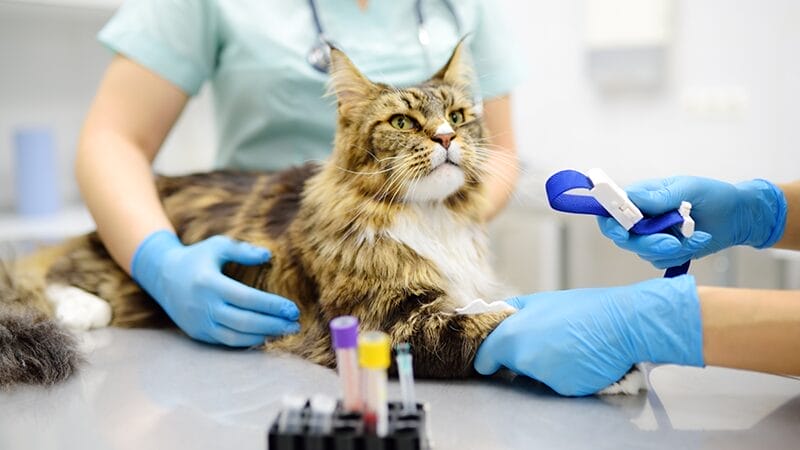
Providing Care for Pets with Chronic Conditions: Guidance for Compassionate Support
Caring for a pet with a chronic health condition can be overwhelming. Learn what you should consider for your pet’s care.
Caring for a pet with a chronic illness is a profound journey that requires compassion, patience, and informed choices. Understanding how to navigate your pet’s ongoing health issues can improve their quality of life and your capacity to support them.
The Impact of Your Pet’s Chronic Condition Diagnosis
Chronic health conditions in pets can range from manageable conditions like diabetes or arthritis to more severe diseases such as Cushing’s disease, congestive heart failure, or cancer. Your pet’s diagnosis sometimes comes after weeks or months of exams, lab tests, and procedures to identify what’s causing their health issues. This time spent waiting for answers can seem unbearable, so it is natural to feel a sense of relief when the official diagnosis is received.
For others, chronic disease is found incidentally during routine physicals. During these occasions, it is normal to experience a degree of shock and confusion as your pet may not have exhibited any signs up to this point.
Regardless of how your pet’s illness is discovered, these feelings quickly give way to a new, more abstract question: now what?

Care Decisions for Managing Your Pet’s Chronic Condition
The decision you make about how your pet’s condition is treated is deeply personal. Because each pet and family are unique, this decision is different for everyone. Your veterinarian will explain all the options available to you, but the most important goal is identifying a plan that you are comfortable with and what may work best for your pet. Here are some factors to consider when weighing treatment options:
- Your pet’s personality – How easily does your pet take medication? What side effects do they experience? Do they enjoy meeting new people, or are they nervous about car rides and going to the vet?
- Time – If you travel for work or have kids in sports and activities, adding extra appointments and a medication routine can feel daunting. Talk with your veterinarian about what your home and work schedules look like so they can partner with you to establish a routine that works for you and your pet.
- Quality of life – Whether you are aware of it or not, you have been evaluating your pet’s quality of life since the day you met them! Keeping in mind what activities bring your pet happiness will allow you to recognize how their personality (and their relationship with you) may be changing as they go through treatment.
- Finances – Although it feels difficult to acknowledge, the cost of veterinary care is a factor for most families. It is important to remember that considering the financial impact when making decisions does not mean that you love your pet any less.
"The decision you make about how your pet’s condition is treated is deeply personal. Because each pet and family are unique, this decision is different for everyone."
– Ann Bancroft, DVM, CCRP, cAVCA
Grieving Your Pet’s Health Diagnosis
The grieving process for pets with chronic illness is incredibly complex. It usually starts before the death of your animal companion, because you are also grieving the loss of their health as well as future possibilities. This is known as “anticipatory grief.” As you grieve, it is normal to experience feelings of sadness, anger, confusion, and uncertainty – much like you would if you were grieving the loss of a human. It is easy to feel isolated when grieving the health of your pet, but there are a few things that you may find helpful during this time.
- Rally your supports – reach out to trusted friends and family members when your pet receives their diagnosis. Be honest with them about how you’re feeling and what support you may need.
- Explore resources – several online support groups also exist for individuals grieving the loss of a pet. There are even groups for those who are experiencing anticipatory grief. Many pet parents also find talking with a therapist helpful.
- Cultivate coping skills – find activities you enjoy that help “recharge” your emotional battery and engage in these in times of stress. This may include exercise, meditation, reading, painting, etc.
- Keep a journal – write down your feelings as your pet’s illness progresses, as well as the things about your pet that you are grateful for. This allows the thoughts that have been occupying your mind to occupy paper instead.

Deciding When to Say Goodbye to Your Pet
Quite possibly the most beautiful and burdensome decision you will ever make for your pet is how their final day will look. Some animals with chronic health conditions pass away suddenly, however many pet parents find themselves considering humane euthanasia to ease their pet’s passing. In this case, they are faced with a daunting question: “When is the right time to say goodbye?”
"Although animals cannot use words to tell us how they feel, you are likely able to understand your pet through their behavior. In fact, when asked how they made the decision about when to say goodbye, many pet parents share that they looked at their pet at some point and 'just knew.' "
– Ann Bancroft, DVM, CCRP, cAVCA
Because no one knows your pet better than you, there is no one better suited to make this decision than you. It may be easier to break down the question of “when” into smaller questions about what would be most meaningful to you, such as:
- Do I want to be present when my pet passes?
- Would I feel more supported if my pet was euthanized at home or at my vet’s office?
- How do I want to remember their last day?”
Although animals cannot use words to tell us how they feel, you are likely able to understand your pet through their behavior. In fact, when asked how they made the decision about when to say goodbye, many pet parents share that they looked at their pet at some point and “just knew.”
You may also find it helpful to reach out to your veterinarian to get their perspective on your pet’s quality of life as you navigate any treatment and supportive care for your pet. Some veterinary practices even offer quality of life consultations. At MedVet, we have veterinary social workers available at select locations, including Boise, Chicago, Columbus, Dallas, and Salt Lake City, who are dedicated to helping you navigate end-of-life decision making. They are here to provide the support and guidance you need during this difficult time.
Ultimately, it is important to trust yourself – you have already made so many of the right decisions for your pet without even realizing it! While managing a chronic condition in a pet is challenging, it can also be incredibly rewarding. It provides an opportunity to deepen the bond with your pet and ensure their remaining time is as comfortable and loving as possible.
Visit our Pet Care Resources library for more pet health and safety information.
FAQs
What are chronic health issues in pets?
What should I consider managing my pet’s chronic health condition?
How do I know when I should say goodbye to my pet?
Pet Care Resources
For ways to ensure your pet lives a happier, healthier life, visit our Pet Care Resources library.
View ResourcesContents
Pet Care Resources
For ways to ensure your pet lives a happier, healthier life, visit our Pet Care Resources library.
View Resources

